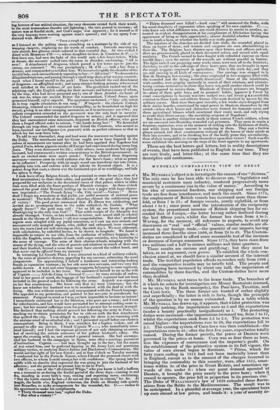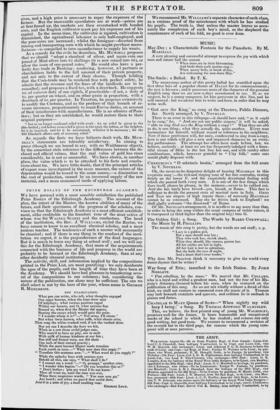MUNDELL'S COMPARATIVE VIEW OP GREAT BRITAIN.
Ma. IlluNDELL's object is to investigate the causes of our "distress." The only ones he has been able to discover are, "legislative an& municipal restraints upon industry, rendered progressively more severe by a continuous rise in the value of money." According to his idea of commercial freedom, our shipping and our foreign trade are free from interference, and mark the result. Since 1775, the employment of British vessels has increased more than three- fold, or from 7 to 23; of foreign vessels, nearly eightfold, or from about 1 to 8; since peace and the introduction of the reciprocity system, the proportional increase Of British shipping has far ex- ceeded that of foreign,—the latter having rather declined during the last fifteen years, whilst the former has risen from 4 to 5. Waving, for the moment, all reference to exports, to avoid any discussion on " real " and " official " values, similar results are ob- served in our foreign trade,—the quantity of our imports having increased three fourths since 1800, or from 28 to 49. The Custom- duties are considered to afford some reasonable test of the increase. or decrease of foreign commerce. Since 1775, they have risen from two millions and a half to sixteen millions and three quarters.
These results are curious and gratifying; but they must be taken, as an argument, cum grano. To establish the whole con- clusion aimed at, we should have a similar account of the internal trade. The test that population affords us reaches only from 1800 and the comparative results may be briefly told. The people and. the shipping have increased by about one half, the importation of commodities by three fourths, and the Custom-duties have more than doubled.
Mr. MUNDELL next turns to the home trade. The branches of it which he selects for investigation are Money Restraints (caused, as he says, by the Bank monopoly), the Poor-laws, Taxation, and the Corn-laws. The three former are treated of rather slightly and superficially ; the latter is rich in facts, though the principle of the question is by no means exhausted. From a table which Mr. MUNDELL has drawn up, it appears, that whilst protection was virtually nothing, the importations were as 3 and the exportations (under a bounty practically insignificant) as 1. The protecting duties were increased—the importations increased too, from 7 to 17, whilst the exportations sunk from 2.5 to 2.4. The protection was raised higher—the importations rose to 20, the exportations fell to 2.1. The existing system of Corn-laws was then established—the importations rose to 46; after the first five years, exportation totally ceased. During the former periods, the prices at Dantzic were governed by the prices at home. Corn was as dear there as here, less the expenses of conveyance and the importer's profit. On the establishment of the protective system in its full vigour, the value of corn abroad began to fluctuate. " Prices, which for forty years ending in 1814 had not been materially lower than in England, except as to the amount of the charges incurred in bringing the commodity to this country, were, after 1815, some- times within 3s. of the price in Great Britain, and sometimes up- wards of 30s. under it : when our great demand operated at Dantzic, it brought the price nearly to the price here ; when it, ceased to operate, the price fell in proportion to its previous rise. The Duke of WELLINGTON'S law of 1828 extended these fluctu- ations from the Baltic to the Mediterranean. The result was to be anticipated. In a plentiful or average year, the speculator buys up corn abroad at low prices, and bonds it: a year of scarcity ar- rives, and a high price is necessary to repay the expenses of the farmer. But the mercantile speculators are at work—prices are at first forced up, the markets are then overstocked with bonded corn, and the English cultivator must pay his expenses out of his capital. In the mean time, the cultivator is injured, cultivation is diminished, the agricultural labourer is only half-employed, and the poor-rates are increased ; whilst the foreigner—diverted from raising and transporting corn with which he might purchase manu- factures—is compelled to turn manufacturer to supply his wants.
As a remedy for the evils he describes, Mr. MUNDELL proposes that we should "adopt a standard of silver, and again coin our pound of Mint silver into 62 shillings (it is now coined into 66), or allow the issue of one-pound notes. He would also have a per- fectly free trade in Banking; rendering, however, all partners or shareholders liable to the full amount of their private property, and not only to the extent of their shares. Though holding that the Corn-trade may be rendered free with perfect safety, he admits that the revenue and the fears of the landlords are to be consulted; and proposes a fixed tax, with a drawback. He suggests an ad valorem duty of one eighth, if practicable—if not, a duty of Ss. per quarter on wheat, and on other grain in proportion, with a drawback of 6s. per quarter. In Taxation, he proposes.extensively to modify the Customs, and as the produce of that branch of re- venue increases, proportionately to remit Excise-duties, on account of their interference with manufactures. He is no admirer of Poor- laws; but as they are established, he would restore them to their original purposes- " Let us no longer confound relief with work : let no relief be given to the able.bodied ; and before even relief is given to the aged, the infirm, or the helpless, let it be inquired, and let it be ascertained, whether it be necessary ; for the 43d Elizabeth allows only of necessary relief."
As regards the facts we have hitherto dealt with, Mr. MiJN- DELL'S statements are tolerably satisfactory. In aiming to prove (though we are bound to say, with no Waithmanic object), by the somewhat stale reference to the differences between the de- clared and official values, that the real value of gold has risen considerably, he is not so successful. We have shown, in another place, the value which is to be attached to his facts and conclu- sions about tin. We have little doubt, that if the principal articles of export Were investigated in the same manner, the causes of the depreciation would be traced to the same source,—a diminution in the cost of production, caused by an increased supply of the raw material, and a more economical mode of applying labour.



























 Previous page
Previous page